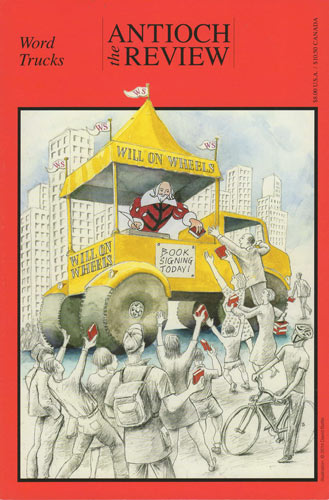The Antioch Review – Fall 2014
The Fall 2014 issue of The Antioch Review took on the theme of what they have chosen to call “word trucks,” which are similar to “food trucks.” The Antioch Review positions themselves to be like a food truck, “serving up a variety of dishes that were intended to stimulate the intellectual palate with ‘the best words in the best order.’” In order to stimulate the palate of every reader, this issue is packed with essays, poetry, fiction, and reviews, thoughtfully crafted and organized. The Fall 2014 issue of The Antioch Review took on the theme of what they have chosen to call “word trucks,” which are similar to “food trucks.” The Antioch Review positions themselves to be like a food truck, “serving up a variety of dishes that were intended to stimulate the intellectual palate with ‘the best words in the best order.’” In order to stimulate the palate of every reader, this issue is packed with essays, poetry, fiction, and reviews, thoughtfully crafted and organized.
One of the first set of items to reach the reader’s ‘intellectual palate’ are several essays. Mark Gustafson in “Bringing Blood to Trakl’s Ghost” explores the important work by James Wright and Robert Bly in translating Georg Trakl’s work into English and the larger implications that the introduction of Trakl’s work had on American poetry. For those who prefer personal essays over academic ones, Patricia Foster’s personal essay, “The Awakening” is guaranteed to creep its way into your bones and chill you to the core.
In LaWanda Walters’s poem, “The Danger of These Lines You Wrote,” the reader is once again asked to think of James Wright as the poem begins with an epigraph from Wright’s poem “Autumn Begins in Martin’s Ferry, Ohio.” The poem takes on two main dimensions: a dialogue between the narrator and a sexual metaphor as a poem written for a lover. The poem, when read as a dialogue between Walters and Wright, begins as a continuation of the last line of the epigraph, “And gallop terribly against each other’s bodies,” and is picked up by the narrator in the first stanza which reads:
is how they make football like Autumn,
roaring down to its tragic foal line
in a knuckle-splitting, skidding glissando
As the poem continues, its intensity grows and becomes completely wrapped up in the musical/sexual metaphor:
Arpeggios, hand crossings,
my prodigy sister. We listened
in the practice cabin, her boyfriend placing the needleon the record, for the orgasm near the end
of the Rachmaninoff Second. But which place?
Was that it? The music got better and better [. . .]
The sexual symbolism here need not be defined; Walters has composed a poem full of layers that are waiting to be unpacked by the reader. Regardless of if you know who Rachmaninoff is, the poem is worth reading.
Each story has something special to offer the reader, but one in particular seems to offer a very unique voice that rounded out the “flavors” being offered up. That piece is a work-in-progress written by Askold Melnyczuk, titled “Recovering Virgins.” The story is told in the third person and follows the day-to-day life of a twenty-year-old girl named Lauren Leroux. Melnyczuk uses the nonchalant, “I don’t care” language of most twenty-year-olds to layer over and attempt to cover up the harsh heartbreaking realities of Lauren’s life: her mother walking out on her and her father who she is trying to support, and dealing with a friend who just got back from a tour of duty in the Middle East who may be suffering from PTSD and becoming closer to breaking with reality with each passing moment. At the end of the day, Lauren does what so many twenty-something’s do to get through the day. She pulls her hood up, becomes invisible, and pretends nothing is real. Melnyczuk provides the reader with a new way to look at the current generation of twenty-somethings and why they do what they do.
Whether you are craving an academic essay on Trakl’s journey into the minds of American poets, a personal essay to touch your heart, a piece of poetry that creates a dialogue, or a fiction piece that will give you new perspective on the seemingly carefree lives of twenty year olds, The Antioch Review has you covered. As if all the aforementioned is not enough, there are several book reviews, and even a piece of work pulled from the journal’s archives.
[review.antiochcollege.org]





